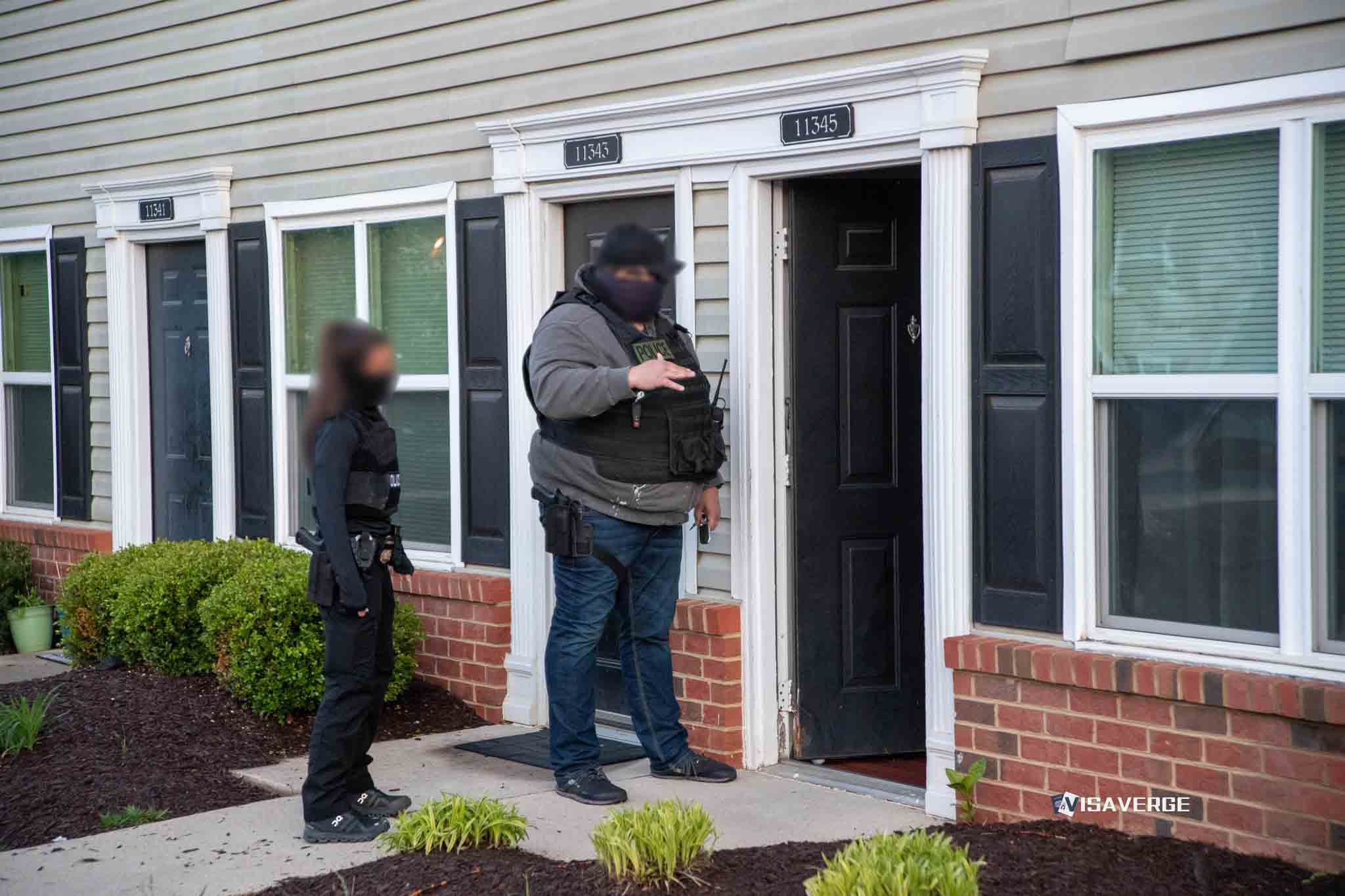Key Takeaways
• On May 22, 2025, eight individuals were indicted in Alabama for illegal reentry, firearm possession, and document fraud.
• Charges include illegal reentry after deportation, firearm possession by non-citizens, and visa fraud under federal law.
• Alabama enforcement has risen sharply in 2025 with over 500 arrests and new state laws expanding immigration enforcement.
On May 22, 2025, a federal grand jury in Huntsville, Alabama handed down indictments against eight individuals for a range of immigration-related crimes. This action, announced by U.S. Attorney Prim Escalona, highlights the ongoing and intensifying focus on immigration enforcement in Alabama under current federal policy. The indictments are part of a broader pattern of increased federal and state efforts to address immigration violations, reflecting both legislative changes and a shift in enforcement priorities.
Who Was Indicted and Why?

The eight individuals indicted by the federal grand jury face charges that include illegal reentry after deportation, possession of firearms by non-citizens, and document fraud. The individuals and their charges are as follows:
- Raul Alvarez-Lopez, 28, Mexico: Illegal reentry after deportation
- Jose Faustino-Climaco, 29, Mexico: Illegal reentry after deportation
- Nazario Vargas-Peres, 27, Guatemala: Illegal reentry after deportation
- Eberardo Yovany Peralta-Cazales, 33, Mexico: Illegal reentry after deportation
– Amilcar Pablo-Cinto, 35, Guatemala: Illegal reentry after deportation - Efren Gimenez-Gimenez, 44, Mexico: Illegal reentry after deportation and failure to register
- Stanley Amalemba Ambeyi, 38, Kenya: Being an alien in possession of a firearm
- Pedro Pedro-Mateo, 30, Guatemala: Fraud and misuse of a visa, permits, and other documents, and failure to maintain personal possession of alien registration
These indictments stem from investigations by Homeland Security Investigations – Atlanta and the Bureau of Alcohol, Tobacco, Firearms, and Explosives (ATF) Nashville Field Division. The cases are part of Operation Take Back America, a nationwide initiative that brings together resources from the Department of Justice’s Organized Crime Drug Enforcement Task Forces (OCDETFs) and Project Safe Neighborhoods (PSN) programs.
What Are the Charges?
Illegal Reentry After Deportation
Six of the eight individuals face charges of illegal reentry after deportation. This federal crime occurs when a person who has been previously deported or removed from the United States 🇺🇸 reenters the country without proper authorization. Under U.S. law, specifically 8 U.S.C. § 1326, penalties for illegal reentry can include fines, imprisonment, and subsequent deportation.
Firearm Possession by Non-Citizens
Two individuals are charged with being an alien in possession of a firearm. Federal law prohibits non-citizens who are unlawfully present in the United States from possessing firearms. Violations can result in criminal prosecution and removal from the country.
Document Fraud and Registration Violations
Pedro Pedro-Mateo faces charges of fraud and misuse of visas, permits, and other documents, as well as failure to maintain personal possession of alien registration. U.S. immigration law requires non-citizens to carry proof of their legal status at all times. Document fraud can include using false or altered documents to obtain benefits or employment, and is prosecuted under 18 U.S.C. § 1546.
Recent Trends: A Pattern of Increased Enforcement
The May 22 indictments are not isolated events. They are part of a clear trend of stepped-up immigration enforcement in Alabama, especially since the start of President Trump’s second term. According to analysis by VisaVerge.com, Alabama has seen a sharp increase in both arrests and prosecutions for immigration-related crimes in 2025.
Previous Indictments
- April 4, 2025: A federal grand jury in the Northern District of Alabama indicted 15 individuals for immigration offenses. Ten were charged with illegal reentry, four with firearm possession, and one with both offenses.
- March 10, 2025: Ten individuals were indicted, nine for illegal reentry and one for firearm possession.
Southern Alabama Enforcement
Federal law enforcement reported over 500 immigration-related arrests in southern Alabama since January 2025. These included:
– Nine alleged members of the Venezuelan gang Trenagua
– Individuals with prior violent criminal records
– 52 immigration-related arrests since January 20, 2025 alone
A federal law enforcement supervisor described the current enforcement push as “unprecedented,” noting the scale and coordination of government resources targeting immigration violations.
Legislative Changes: Alabama’s New Immigration Laws
Alabama’s legislature has moved aggressively to pass new laws that support and expand federal immigration enforcement. These bills are designed to give local law enforcement more tools to identify and detain undocumented immigrants and to create stricter penalties for those who violate immigration laws.
Senate Bill 53
- Requires local law enforcement to verify the immigration status of anyone arrested
- Makes it a crime to transport undocumented immigrants into Alabama
This bill aims to ensure that anyone arrested in Alabama is checked for immigration status, and it targets individuals or organizations that help undocumented immigrants enter or move within the state.
Senate Bill 63
- Requires law enforcement to collect fingerprints and DNA samples from arrested undocumented immigrants
Supporters argue this will help identify repeat offenders and link individuals to other crimes, while critics worry about privacy and potential misuse of genetic data.
House Bill 7 (Laken Riley Act)
- Allows local and state law enforcement to enter agreements with federal agencies to enforce immigration laws
- Named after Laken Riley, a student killed in Georgia in 2024
This bill is intended to formalize cooperation between Alabama law enforcement and federal immigration authorities, making it easier to detain and remove undocumented immigrants.
For more information on Alabama’s legislative process and current bills, readers can visit the Alabama Legislature’s official website.
How Do These Laws Affect Immigrants and the Community?
For Immigrants
- Increased risk of arrest and prosecution: Non-citizens, especially those with prior deportations or criminal records, face a higher chance of being detained and charged.
- Greater scrutiny during routine encounters: Even minor infractions can lead to immigration status checks and possible detention.
- Potential for family separation: Arrests and deportations can separate families, especially when parents or breadwinners are detained.
For Employers
- Stricter penalties for hiring undocumented workers: Employers must be vigilant in verifying work authorization documents.
- Increased audits and inspections: Federal and state agencies may conduct more frequent checks of employment records.
For Law Enforcement
- Expanded responsibilities: Police officers are now required to check immigration status and collect biometric data, adding to their workload.
- Training requirements: Federal prosecutors are providing regular training to help local law enforcement understand and enforce new immigration laws.
For the Community
- Public safety concerns: Supporters argue that removing individuals with criminal backgrounds makes communities safer.
- Fear and mistrust: Critics warn that aggressive enforcement can discourage immigrants from reporting crimes or cooperating with police, potentially making communities less safe.
Support and Criticism: Different Perspectives
Supporters Say:
- Public safety is improved by removing individuals with criminal records or gang affiliations.
- Clearer legal frameworks help law enforcement do their jobs more effectively.
- Federal and state cooperation ensures that immigration laws are enforced consistently.
Critics Argue:
- Risk of racial profiling: Broad enforcement measures may target people based on appearance or language rather than actual immigration status.
- Discourages crime reporting: Immigrants may avoid contacting police, even as victims or witnesses, out of fear of deportation.
- Overly broad laws: Some provisions may criminalize innocent activities, such as giving a ride to a neighbor who lacks legal status.
Civil rights groups and immigrant advocates have raised concerns about the potential for abuse and the impact on families and communities.
The Legal Process: What Happens Next?
For the eight individuals indicted on May 22, the legal process will follow standard federal criminal procedure:
- Arraignment: The accused will appear in federal court to hear the charges and enter a plea.
- Detention hearings: The court will decide whether to hold the defendants in custody or release them on bond.
- Pretrial motions and hearings: Lawyers may challenge evidence or seek to dismiss charges.
- Trial: If the case goes to trial, prosecutors must prove the charges beyond a reasonable doubt.
- Sentencing: If convicted, defendants face penalties that may include prison time and deportation.
It’s important to remember that an indictment is not a conviction. As the U.S. Attorney’s Office stated, “A defendant is presumed innocent unless and until proven guilty.”
For those charged with immigration offenses, the consequences can be severe. Illegal reentry after deportation can result in up to 20 years in prison if the person has a prior criminal record. Firearm possession by a non-citizen and document fraud also carry significant penalties.
Individuals facing these charges may need to complete or provide specific immigration forms, such as Form I-212, Application for Permission to Reapply for Admission into the United States After Deportation or Removal, if they seek legal reentry in the future.
What Should Immigrants and Their Families Do?
If you or a loved one is affected by these enforcement actions, consider the following steps:
- Consult a qualified immigration attorney: Legal advice is essential for understanding your rights and options.
- Keep important documents accessible: Carry proof of legal status, such as a green card or work permit, at all times.
- Know your rights: You have the right to remain silent and to speak with an attorney if questioned by law enforcement.
- Stay informed: Monitor official government sources, such as U.S. Citizenship and Immigration Services (USCIS), for updates on laws and procedures.
Broader Implications: What Does This Mean for Alabama and the U.S.?
The recent indictments and legislative changes in Alabama are part of a nationwide trend toward stricter immigration enforcement. President Trump’s administration has made immigration a top priority, with federal and state agencies working together more closely than ever before.
- More arrests and prosecutions: Expect continued high numbers of immigration-related arrests and federal prosecutions in Alabama and other states.
- Tougher state laws: Other states may follow Alabama’s lead in passing laws that give local police more authority to enforce immigration rules.
- Ongoing debate: The balance between public safety and civil rights will remain a contentious issue, with strong opinions on both sides.
Actionable Takeaways
- If you are an immigrant in Alabama, stay informed about new laws and enforcement actions.
- Employers should review hiring practices to ensure compliance with federal and state requirements.
- Community members can support affected families by sharing accurate information and connecting them with legal resources.
- For the latest updates and official information, visit the U.S. Department of Justice’s immigration enforcement page.
The situation in Alabama shows how quickly immigration policies and enforcement can change. By staying informed and prepared, individuals and communities can better protect themselves and respond to new challenges as they arise.
Learn Today
Federal Grand Jury → A panel that reviews evidence and issues indictments for federal crimes like immigration offenses.
Illegal Reentry After Deportation → Entering the U.S. without authorization after being formally removed or deported previously.
Document Fraud → Using false or altered immigration documents to obtain benefits or evade laws.
Operation Take Back America → A national law enforcement initiative targeting immigration crimes with coordinated federal resources.
Alien in Possession of a Firearm → A non-citizen unlawfully possessing a firearm, prohibited under U.S. federal law.
This Article in a Nutshell
Eight individuals were indicted on May 22, 2025 in Alabama for immigration crimes including illegal reentry after deportation and firearm possession. These cases reflect increased federal enforcement efforts and new state laws targeting undocumented immigrants, signaling a growing focus on immigration violations and public safety concerns statewide.
— By VisaVerge.com
Read more:
• Kentucky indicts six foreign nationals for immigration and gun offenses
• Federal Grand Jury Hits Wisconsin Judge in Immigration Case
• USCIS expands efforts to uncover and prosecute visa fraud
• Trump Points to Others When Asked About Alien Enemies Act Use
• 16 Charged with Federal Immigration Crimes in Kentucky













